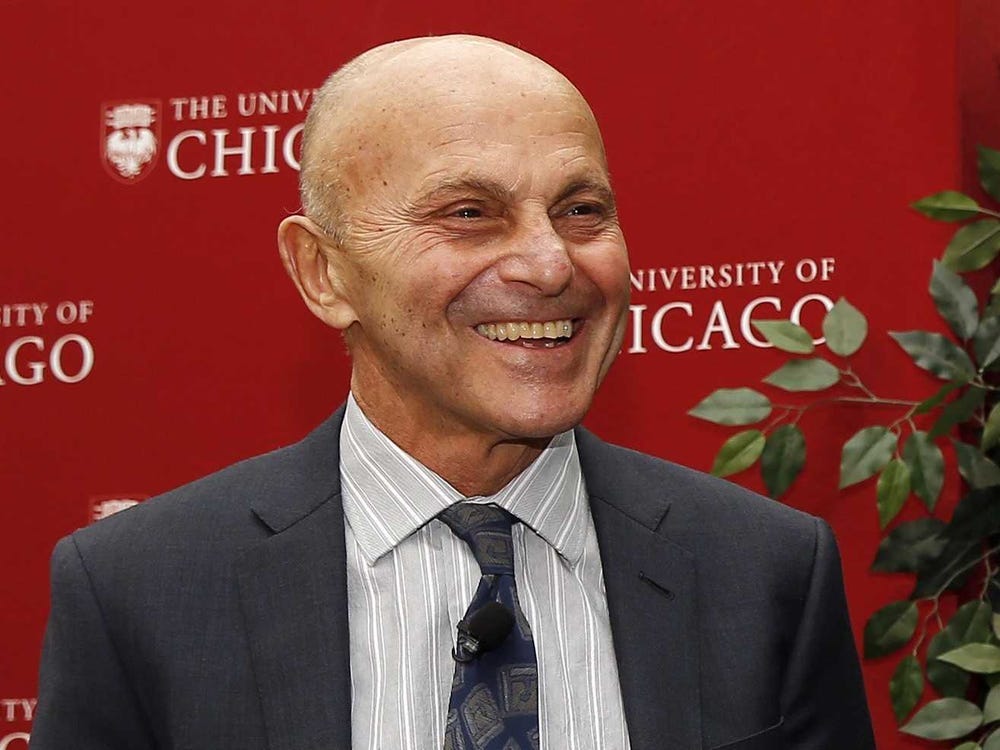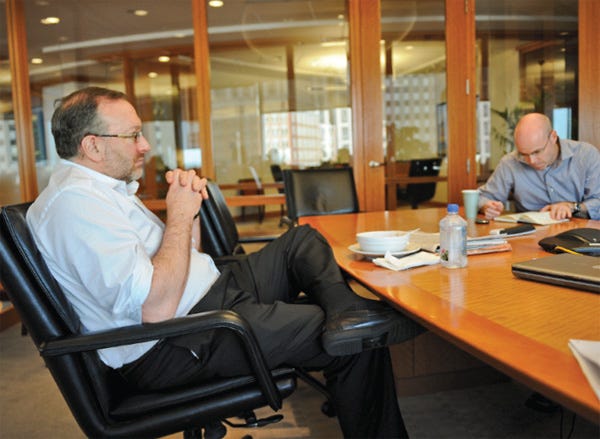Seth Klarman and the Baupost Group
A podcast with Ted Seides
Seth Klarman doesn't need an introduction. He is the billionaire founder of Baupost Group and a legendary value investor.
While Klarman rarely makes public appearances, he has been active in the media recently due to his role as an editor for the latest edition of "Security Analysis" by Graham and Dodd.
Recently he participated in a podcast with Ted Seides on the Capital Allocator Podcast, from which I want to share some takeaways. If you're interested in listening to the entire podcast, click on the link below:
How Seth Klarman Got His Start
Klarman grew up in the Baltimore area (born in NYC) and attended Cornell University. He always had a passion for numbers and enjoyed studying baseball batting stats. Later, he landed a significant role where he became a protégé of the famed value investor, Michael Price.
The connection came through his uncle on his mother's side, who lived in New York and was a tax attorney. This uncle introduced Klarman to Max Heine, the founder of Mutual Shares. Max Heine was a classic deep-value investor who amassed a fortune buying distressed railroad bonds. He founded Mutual Shares funds to practice deep-value and distressed investing.
As a result, Klarman secured an internship at Mutual Shares, where Michael Price, a protégé of Max Heine, was managing the day-to-day operations for Max. Price took the approach of giving Klarman a prospectus and simply saying, "Figure this out," which is a common initiation for junior analysts on the buy-side.
At Mutual Shares, Klarman gained valuable insights into different ways of making money in the stock market, such as special situations, arbitrage, and distressed debt.
On Efficient Market
During Klarman’s prime, efficient market theory gained a strong foothold in the economics/finance academic community. Ted Seides asked Klarman what he thinks of efficient market and index fund investing.
Klarman used an analogy of the Wright brothers versus a gentleman named Samuel Langley at the Smithsonian Institution: Langley had a high pedigree with academic fame but failed. The Wright brothers went to Kitty Hawk (North Carolina) where winds were strong they could experiment with a real environment for flying. The Wright brothers figured it out. Langley’s plane plopped in the water.
As a practitioner, Klarman was convinced real markets do fluctuate, and stock prices do deviate from the intrinsic value of their underlying businesses. And one needs to actually ride a horse instead of sitting on the fence and observing a bunch of horses. You wouldn’t learn how to swim by watching a YouTube video, right?
When I was in college, I remember my finance and economics professors would confidently state their theories are right, but always with the caveat of the requirements of perfect conditions which never hold true in real life.
Klarman quoted Yogi Berra: “In theory, there is no difference between theory and practice. In practice there is.”
On Deciding to Attend HBS
Klarman didn't want to go to business school. Well, why would he, when he already had a dream job?
His rationale for attending Harvard Business School: It can make him a better investor by learning more about businesses and what makes a good business.
He did rub shoulders with classmates such as:
Jamie Dimon, CEO of JP Morgan
Steve Mandel, founder of Lone Pine Capital
Jeff "I-fly-two-business-jets-at-the-same-time" Immelt, one-time CEO of GE.
Klarman did not need business school, but at least he chose (and was able to) attend one of the finest business schools in the world.
He interned at Salomon Brothers in IB because many of his peers were pursuing investment banking at the time (investment banking remained a popular MBA path through the 90s, but then things changed). He didn't love IB, but it was a "great experience."
On Value Investing
Markets are inefficient. Prices falling below underlying value create attractive value investments. At other times, they are too valued, or the price exceeds the value, so you sell. Alternatively, if you are inclined, you may short1.
A stock might be at a discount, and you buy it, but then the stock can go to an even bigger discount. You have to be comfortable when a bargain becomes an even bigger bargain. It’s a mistake to look to the market for feedback because you will just be following popular opinion – you need to see the market as the manic counterparty for opportunities.
My take: Easier said than done. Many of those “becoming a bigger bargain” companies turn out to be secular decliners whose intrinsic value is eroding. People like to describe the aforementioned companies as “value traps,” but a value trap is just a wrong investment decision that you only realize after the fact.
Klarman concedes that the world has changed. Value investors cannot solely rely on mean reversion to make money; they have to pay attention to secular changes. This has made his style of value investing harder. I view Klarman as a deep value and traditional value investor, but clearly, by owning Alphabet and Meta (sold the latter), he is trying to adapt. It’s no longer just about crunching a few numbers and saying, "This is mispricing" – (traditional) value investors need to dig deeper.
Klarman shared a pattern cognition: stocks outside the index are likely to be more mispriced, and one can buy a company of the same quality at a discount compared to the one in the index, with getting into the index as a catalyst for value realization.
On Baupost
Klarman’s HBS professor, whom he took a real estate course with, sold a stake in Boston Channel 5 to Metro Media at a fancy price2. They created Baupost as a family office to manage the money.
The original plan was to entrust the money with smart external money managers. However, there were issues:
Managers engaged in groupthink and owned the same stocks; at the time, everyone was buying Warner stock because the company owned Atari and video games were a popular trend.
Managers didn't invest in the funds they managed - no skin in the game
Therefore, Baupost decided to manage the money themselves. Klarman was asked to be that person. If he didn't join Baupost, the firm would have been formed without him. The rest is history.
Baupost doesn't have a focus list of equity ideas. They are generalists and truly opportunistic. If there is a delisting of Turkish stock (ie. an event), they will look at it. They are looking for mispricing across the entire spectrum. It seems hard to do, but the willingness to dig deeper into neglected and complex situations is probably why Baupost has had so much success. Baupost has only lost money in five of its 41 years of history.
For Klarman, the stock investing game has changed for the worse. He concedes he does a poor job of understanding the value of intangibles in businesses. I admire him for being candid about knowing his circle of competence.
I sense Klarman is focusing a lot more on private markets going forward. He shared an example of instructing sell-side brokers to not tell him insights on IBM or a new rating for Microsoft. Instead, if the salesperson has a secondary partnership interest or an illiquid stake in a private company, Baupost will have a bid for them.
Baupost has never owned anything in China because they believe the government there is authoritarian. They didn't want to be on the wrong side of such markets. Also, not having folks on the ground there is a real disadvantage. As a result, Baupost has no idea what the risk premium should be for buying African or Asian equities.
LP alignment is one of the most important success factors. A lack of long-term clients means an inability to make long-term investments. Klarman tells prospective LPs that he won't take their money until they read the annual letter. He anticipates he won’t be running Baupost for longer than 15 years but will be involved in some capacity.
On Portfolio Management
Klarman still has the final say on the portfolio at Baupost. They pay people based on both their individual bottom line and the firm's bottom line as a whole.
Klarman is opposed to over-diversification. Similar to Warren Buffett, his risk management is to think more about the downside of individual names.
On a portfolio level, instead of using a formula, Klarman thinks intellectually about correlations of Baupost’s exposures. Baupost does overlay hedges – macro, commodity, and interest rate hedges as appropriate based on each individual name. They also use portfolio puts. He is willing to hold cash. For this cycle, perhaps he has held onto cash for too long. But I respect him for not being forced into the crazed party.
On Impact of AI on the Stock Market
Inefficiency will persist because computers will mimic what humans do as they are trained to do so. So the market won't be fully efficient. For example, Klarman highlighted esoteric opportunities (special situation, distressed, etc.) where AI will have a sample size of one on an esoteric transition and doesn't know what to project.
On the Current Market Environment
Nobody is comfortable with a 50% drop in the stock market, and yet Americans own more stock than ever before. The average long-term market multiple is 17 times (earnings), but today it’s 20 times, and at some moments it was 30 times and at other times it was 10 times. Klarman is worried about market multiple contractions, and Baupost uses portfolio puts to hedge against that.
Klarman admits today’s market condition has been the weirdest time since he has been in business for 40 years. There was a credit bubble that became an “everything bubble” with cheap capital, start-up manias, SPACs, meme stocks, and crypto. He doesn’t believe we are out of the bubble. The bubble did a good job of collapsing in 2022, but the market has rallied back so much that we are now in a bull market according to the standard definition.
He likes credit. Price inefficiencies occur when bonds get downgraded below investment grade, and holders want to sell those. They have found enough debt to be 15% of the overall portfolio.
On Bank Failure
Klarman is worried about dependence on government rescue. In the case of SVB, the government changed the FDIC rules. Moral hazard is very high.
He wouldn’t be surprised to see private credit blow up in certain pockets. Private equity funds have been rescued historically. He thinks there should be an asterisk to PE because private equity firms got rescued by the Fed cutting rates and Congress' stimulus plans during the 2008 crisis. A lot of PE debt was trading down to 50 cents on the dollar, and yet those deals ended up working out.
He suspects PE might not get rescued in the future, especially with the imbalance in society, with moms and pops wondering why they are bailing out Wall Street. We will see: there are too many Wall Streeters inside the government to be so sure about that.
On the Importance of Studying Financial History
People should study history when not everything was rescued and try to imagine a bear market that didn't immediately lead to a buying opportunity.
For example, in 1973-74, stocks were trading at single-digit earnings multiples, and while the companies weren't going out of business, people needed to sell stocks to pay bills. We really haven't had a situation like that for a long time because of government intervention.
Pattern recognition as a tool will continue to matter. Patterns don't repeat exactly but have similarities. Jim Grant likes to say science progresses secularly but finance addresses cyclically. Most ideas have been around before; we just repeat the same mistakes. There's a lot to learn from past mistakes.
Studying history helped Klarman in a bad market to make tough decisions, and informed him how bad things can get, which helps frame a reasonable range of outcomes.
I have book recommendations for financial history:
On a 2nd Edition of Margin of Safety
Klarman thinks there is a reason to redo or add new sections. He also wants to talk about his experience applying Graham and Dodd principles to private investments.
Resources for your public equity job search:
Research process and financial modeling (10% off using my code in link)
📇 Connect with me: Instagram | Twitter | YouTube | LinkedIn
If you enjoyed this article, please subscribe and share it with your friends/colleagues. Sharing is what helps us grow! Thank you.
Thanks for reading. I will talk to you next time.
Shorting has more nuances than that, valuation shorts without a catalyst are not attractive shorts
Metro Media sold its TV channels to News Corporation owned by Rupert Murdoch











